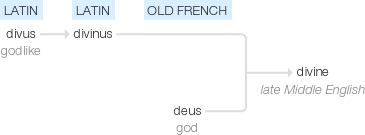Divine
late Middle English: via Old French from Latin divinus, from divus ‘godlike’ (related to deus ‘god’).
wiktionary
From Old French divin, from Latin dīvīnus(“of a god”), from divus(“god”).
Replaced Middle English devine, devin from Middle French deviner, from Latin dīvīnō.
etymonline
divine (adj.)
late 14c., "pertaining to, of the nature of, or proceeding from God or a god; addressed to God," from Old French divin, devin (12c.), from Latin divinus "of a god," from divus "of or belonging to a god, inspired, prophetic," related to deus "god, deity" (from PIE root *dyeu- "to shine," in derivatives "sky, heaven, god").
Weakened sense of "excellent in the highest degree, heavenly" had evolved by late 15c. The phrase divine right, indicating one conferred by or based on ordinance of God, is from c. 1600.
divine (v.)
"to conjure, to guess," originally "to make out by supernatural insight," mid-14c., divinen, from Old French deviner, from Vulgar Latin *devinare, a dissimilation of *divinare, from Latin divinus "of a god," from divus "of or belonging to a god, inspired, prophetic," related to deus "god, deity" (from PIE root *dyeu- "to shine," in derivatives "sky, heaven, god"). Latin divinus also meant, as a noun, "soothsayer." Related: Divined; divining. Divining rod (or wand) attested from 1650s.
divine (n.)
c. 1300, "soothsayer, sorcerer, astrologer," from Old French devin "soothsayer; theologian" and directly from Latin divinus, "soothsayer, augur," noun use of an adjective meaning "of or belonging to a god," from divus "of or belonging to a god, inspired, prophetic," related to deus "god, deity" (from PIE root *dyeu- "to shine," in derivatives "sky, heaven, god").
Meaning "ecclesiastic, theologian, man skilled in divinity" is from late 14c. Sense of "divine nature, divineness" is from late 14c.
